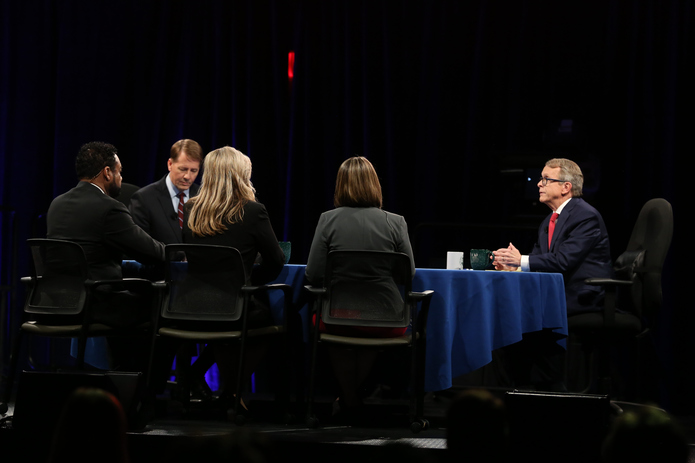Thursday, August 08, 2019
Is There a Better Way to Hold Political Debates? We're Glad You Asked.

by Jill Zimon, Ohio Debate Commission
Has four nights of presidential primary debates in the past two months left you wanting more, or dreading the ten (yes, 10) coming up between now and the middle of 2020?
Don’t answer that.
Social media, a 24-7 news cycle, and the infusion of concern for ratings have fired people up on both sides of the screen. On the broadcaster side, they’re talking staging, rules, and time restrictions. On the viewer side, we’re hearing yelling, seeing split screens, and we can’t decide if we want elevator speeches or Lincoln-Douglas length policy exploration. In a column published on July 30 in the Washington Post, Margaret Sullivan writes, “There’s got to be a better way.”
Turns out there is: statewide debate commissions. Don’t worry if you’ve never heard of them; only four states have them right now, and Ohio’s is the newest, created in 2018 as a project of the City Club and soon to be an independent nonprofit organization.
The Indiana Debate Commission was the first to form, in 2007, and put on its first debates in 2008. Since then, they’ve hosted more than 20 debates, and every single candidate running for the races they’ve covered has been present. The record of appearance is also 100% for the Utah Debate Commission and the Seattle CityClub’s Washington State Debate Coalition.
What all four organizations have in common is that they want to build a way to present candidates authentically and engage voters meaningfully with the people who want to earn their vote. The collaborations involve media, academic, and civic institutions committed to prioritizing high quality debates that elicit information deeper than a stump speech or televised campaign ad. They make sure the broadcast feed is free to any outlet interested in showing the debate, neutralizing complaints from viewers related to exclusivity, but more importantly, ensuring that as many people as possible can watch the debate live.
Debate commissions also put a premium on questions coming from the public. In Ohio, all the questions used in our two debates - one gubernatorial and one U.S. senate - derived from those submitted online by Ohioans. This included several submitted as videos. They were all reviewed and considered by a group of commission partner organizations, and then refined by the moderators and executive producer of the debate. During the U.S. senate debate, we then had audience members ask questions live and we broadcast two video questions. This isn’t a new concept; the Open Debate Coalition has long championed debates in which all questions come from voters and has built and used civic tech to make that happen multiple times.
Overall, we would love to see more experimentation that touches the voter, and provides less predictability that can shroud the authenticity of a candidate. Meeting such a goal requires intentionality and preparation on the part of the producers and moderators, at a minimum, pre- and during the debate. Statewide debate commissions do exactly that.
Data indicates tens of millions of people are tuning in to watch the 2019 primary debates. That presents a real opportunity for introducing, perhaps even testing out, innovations in political debates that expands engagement of the audience outside the studio, as well as on the stage and in the venue.
As Sullivan concludes in her column focused on the frustrations that exploded online and on air last month, “The debates aren’t completely pointless, of course...but they should be so much better. This moment in history demands it.”
No debate about it. We agree, and we’re here for the solutions.
Don't forget register here for No Debate About It: The Future of Political Debates at the City Club on Monday, August 12!





